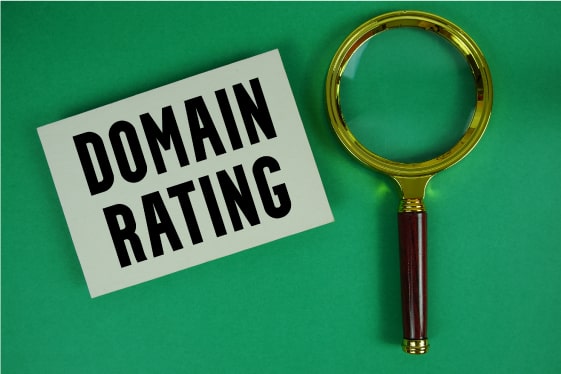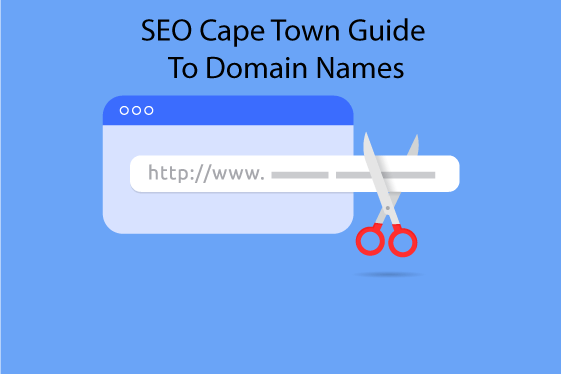Your SEO Cape Town Guide To Domain Names
In this brilliant SEO Cape Town Guide to Domain Names, it may seem like a small, fairly insignificant detail of your website, but a domain name can actually have an impact on your SEO rankings. Your domain name is almost like the first point of entry to your business for many users, so making sure it distinctively identifies your site and lets visitors and search engines know what services you provide is essential. In this succinct guide, we will go through seven steps that will assist you in choosing the right SEO-friendly domain name for your website in order to effectively boost rankings and visibility.
Back to Basics: What is Domain Name?
Your domain name serves as a kind of digital equivalent instead of a physical address. It is how users visit and interact with your business/website online.
But more than that, a good domain name captures your brand’s purpose in a distinctive and unique way. Something as “simple” as choosing the right domain name can signal trustworthiness and authority to users. But even beyond that, committing to populating your domain with quality content and reputable backlinks can result in boosting your business’s SEO rankings.
So, in this SEO Cape Town Guide, we’ve established why choosing the right domain name is beneficial, but now lets look at some more technical aspects of a domain name:
– The top-level domain (TLD) — the addition of .com, .org, or .net. at the end of the domain name – this generic type is a gTLD or generic top level domain.
– The ccTLD is a country specific type of TLD.In South Africa it would be .za and the .co would be the second level domain. See the diagram below:
Seems simple enough, right? Not so fast – understanding how your chosen domain name can affect your website and business in terms of SEO is crucial, so before you settle on anything, let’s continue unpacking more domain basics below.

Back to Basics: What is Domain SEO?
A domain name is something that comes across as pretty minor, but the truth is that it can have a real effect on your website’s SEO and impact certain ranking signals, having SEO Cape Town in your domain would help this if you were targeting Cape Town.
Although having a SEO-friendly domain name will directly result in higher ranking positions, it is essential as it positively interacts with search engine signals, sometimes it can be at the cost of your brand looking spammy. As brands develop brand equity they tend to shift away from the keywords in the domain to just the brand name. SEOmoz.com became Moz.com eventually as an example.
Believe it or not, but the right domain name has an impact on many important SEO factors. Signals relating to authority and trustworthiness on certain topics, ranking for desirable keywords and even the overall traffic of your website can be impacted by your choice of domain name.

When we speak of Domain SEO we are referring to all practices involving various different optimisations (that we will discuss soon) to improve your website for search engine crawlers as well as your human users and potential customers.
A straightforward, focused domain name demonstrates a clear purpose, while an overtly promotional, gimmicky name can indicate untrustworthiness and tarnish your overall brand reputation.
Throughout this SEO Cape Town Guide To Domain Naming we will go through some of these key SEO practices that include exercises for domain optimisation, such as the process of picking out a simple domain name, optional subdomain as well as a top-level domain (TLD) to create a refined and clear brand identity. Additionally, other general SEO signals should be consistently evaluated, such as the technical health of your website: make sure to double check your tag optimisations and page loading speeds. Similarly, backlinks play a key role as they serve as authority-building signals for search engines and readers alike.

A level of content management is also required with domain SEO so as to ensure your website’s domain is providing original, in-depth content for visitors. Taking this into account in addition to the next seven steps that follow, by the end of this guide your website’s domain, and your domain’s SEO should be well-positioned for higher rankings and increased website traffic.
Step 1: Selecting the Correct Keywords according to this SEO Cape Town Guide
It might be surprising to hear, but over the years, including keywords describing the nature of your business are more of a bonus, not a requirement in the domain naming. This is not to say they are not useful as a relevancy signal , they are just not as important as they once were when selecting a domain name.
Opt for something that identifies your brand over keyword stuffed domains. For example,Tesla uses the domain name www.moz.com – a simple, to the point name that both identifies the brand while also providing further information about their primary product/service.
Remember, your entire domain name does not need to be made-up of strictly keywords. Conduct some keyword research to discover some popular search terms that adequately describe your business. Once you have compiled a list of possibilities, really focus on narrowing it down until only the most precise and focused terms that accurately describe your business remain.

Step 2: Keep your Domain Name Short and Sweet
Try to register a domain name with only one or two keywords, the shorter the better! The length of your domain does not directly affect your SEO, but research shows that the most common domain length is around 12 characters long (DomainWheel.com) with popular websites even tending to be shorter. This is because longer domain names tend to be harder to remember for new customers, so even encapsulating the idea of your brand into a catchy acronym for a domain is an option but if you can, include the keyword. This is an important tip from our SEO Cape Town Guide.
Step 3: Domain Readability Matters
Other than the length, your domain name needs to obviously be readable. Domain names that are explicit and clear builds understanding and trust among human users and search engines alike. Similarly, domain names that utelise numbers and symbols in a confusing way have the opposite effect, leaving everyone confused and with potential security concerns.
Simpler, shorter domain names also have clear effects on SEO efforts, with research showing reduction in traffic for names longer than seven characters, reduced traffic penalties for less complex domains, and interestingly, the repetition of vowel and consonant sounds in chosen names correlated to a lower ranking (University of Pennsylvania, 2016).

Step 4: Selecting a Domain Extension
As briefly discussed previously, a TLD is the extension that follows on after your second-level domain, and different extensions can affect the trustworthiness of your website.
For example, in this SEO Cape Town Guide, we all recognise the .com TLD (top level domain) as probably the most popular and therefore most trusted extension in the world. While this top level domain is certainly the most memorable comparatively, it won’t actually provide any SEO benefit besides building trust with your customers, especially if you are not based in the US.
There are also many reputable extensions besides .com continuing to garner user confidence, .co, .net, and .co.za are a few that people recognise as safe despite .com being absent. Do some research into these extensions to figure out which one will be the best fit for your business, especially considering your audience location targeting when making this decision.
Step 5: Alternative Domain Extensions
TLD extensions might be the most trustworthy, but as a result can oftentimes become very costly… Instead of breaking the bank trying to sustain a .com TLD, why not try out a TLD extension that further describes what your website or business showcases?
For example, many organisations and non-profits use .org, and a retailer might opt for .shop or .apparel – all of these examples simply give search engine crawlers (and human users!) a clearer idea of what your brand is about before they even click, and as a result, improving SEO rankings at the same time.
Step 6: Be Cautious of Special Characters
The implementation of special characters in your domain name might feel like an alluring and easy way to make your name unique and stand-out, but be careful, as it might end up harming your SEO more than helping it.
This is due to the fact that search engines find certain special characters difficult to decipher and therefore understand. The same goes for people, as utelising these characters might impact their user experience negatively, creating distrust and lack of credibility moving forward.
As a result, SEO best practice avoids all uses of confusing characters like hyphens, digits, stars(*), or ampersands (&). As an SEO Cape Town, we always say make it look as least spammy as possible.
Step 7: Find a Trustworthy Domain Registrar
A domain registrar keeps your site active and accessible, a responsibility that needs to be maintained consistently. It therefore goes without saying, but where exactly you buy your domain from matters.
Consider looking into a registrar’s downtime, auto-renewal notice process, and security features, all of which if not handled by a credible registrar could cause your site to go down. When this happens, search engines like Google cannot access your website, having an impact on your SEO as crawlers no longer see your site as reliable or user-friendly.
Certain registrars also offer hosting packages that sometimes include distributed servers and integration with a content delivery network (CDN) which can be really beneficial if serving an international audience, just always make sure to double-check things like site speed (a known ranking factor for Google).
SEO Cape Town Tips To Level-Up your Domain SEO
Now that we have covered domain SEO basics as well as the steps involved in creating and choosing an SEO-friendly domain name, let’s dive a little deeper.
There are a few ways in which we can continue to improve our domain SEO that are not directly related to the domain itself, but still equally important. An SEO strategy that has a holistic approach and considers how all elements impact each other is crucial for successful SEO results.
1. Prioritise Helpful Content
Although as we have seen, there are several elements to successful SEO, content is for sure one of the most important and powerful factors influencing your SEO rankings.
As far as possible you must ensure the content you publish to your domain is researched in-depth, original, and most importantly, valuable. Producing high-quality content like this is the single best way to improve your authority (especially in an oversaturated marketplace) and increase your website traffic.
To begin, start by creating landing pages and blog posts that are optimised for SEO. Other pieces of content to consider are listicles, videos, how-to guides, case studies, etc.
Creating quality content that strives to be better than competing brands can boost your SEO standings greatly, while simultaneously creating the opportunity for potential backlinks to be earned.
2. Our SEO Cape Town Guide to Generating Domain Backlinks
Backlinks are extremely advantageous both in terms of traffic as well as SEO ranking – they rely on hyperlinks posted on an external site that serves to credit or reference your work while also directing traffic from other websites directly to your domain.
Studies show a strong backlink profile is almost always required in order to rank for competitive keywords (Ahrefs). Now in order to build this profile, we need to go back to our content production. Creating valuable, helpful content that is well-researched positions your site as an authority in your niche, and becoming an authority in your niche is how you build backlinks.
Search engines like Google always prefer organic (non-paid) backlinks, and so while publishing high-level content is the best way to secure these backlinks, alternative methods can include reaching out to other brands and businesses within your field and see if they would like to partner with you on a piece of content, or even send them some content their website might be interested in publishing by backlinking to your domain. BrandSeed can help you create the right type of content.
Remember, your domain name is not simply clickable text on a screen, but should give visitors (and search engines) a succinct and clear idea of your brand – who you are, what you do, and what visitors can expect from you. By implementing the steps in this guide, you will be able to successfully craft an SEO-friendly domain name that allows you to compete for ranking among other popular brands.
Your domain name not only forms an integral part of your brand’s digital identity, but choosing the right one and optimising for SEO in the ways we have covered will allow your business to continue to reap long-term SEO benefits. That’s all for this SEO Cape Town Guide.

